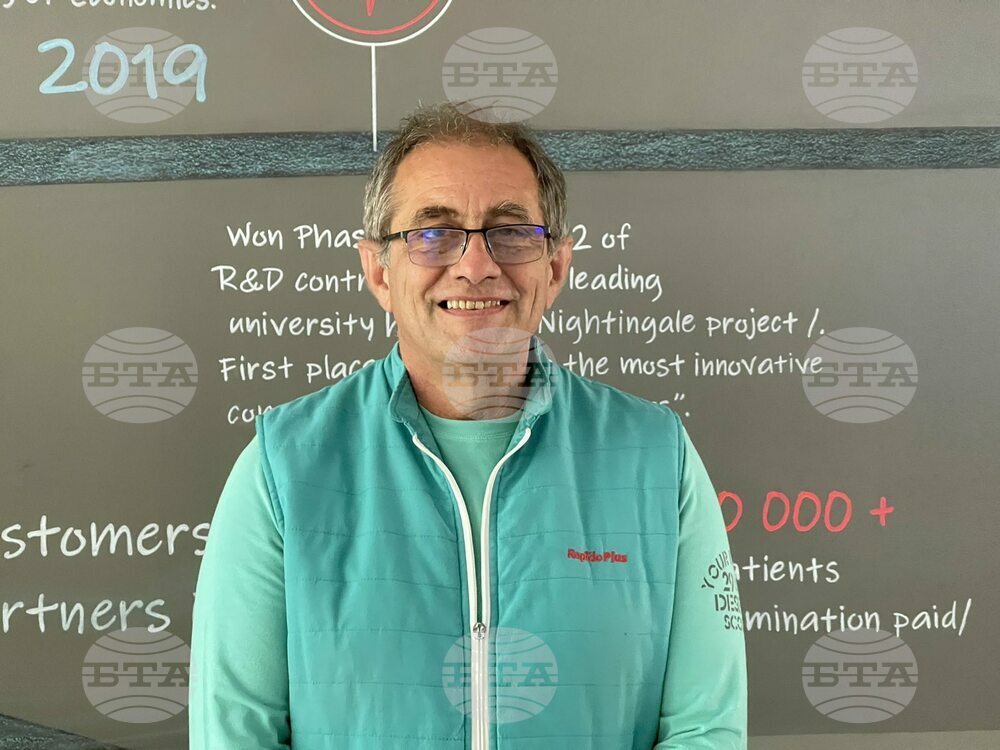site.btaBulgarian Solution for Remote Medical Monitoring Wins International Award for Health and Wellbeing


A Bulgarian solution for remote medical monitoring and measuring of vital signs has won one of the WSA awards for 2023 in the category of health and wellbeing. The award-winning solution was developed by, and is applied in the daily work of, Checkpoint Care LLC based in the southern Bulgarian town of Kazanlak.
A Bulgarian solution for remote medical monitoring and measuring vital signs has won a 2023 World Summit Award (WSA) in the Health and Well-being category. The award-winning solution was developed and is currently applied in the daily work of Checkpoint Cardio LLC, based in the southern Bulgarian town of Kazanlak.
WSA, an initiative launched in 2003 within the framework of the UN World Summit on the Information Society, uses an awards mechanism to identify, select, and promote local digital solutions that positively impact society and contribute to achieving the UN Sustainable Development Goals.
The award-winning solution
Checkpoint Care's project, Checkpoint Cardio, enables remote medical monitoring and real-time measurement of vital signs via wireless data transmission to healthcare providers (HCPs). The system deploys smart wearable sensors for real-time high-resolution data collection, AI-based Digital Twins to create accurate digital biomarkers of patients, and a Virtual Care Center to provide remote clinical support and continuous technology-driven care.
The system can be used by patients of all ages, including adults and children, with a wide range of conditions: cardiovascular diseases, respiratory disorders, chronic lung diseases, severe chronic diseases (for outpatient treatment, care of patients in remote areas, or those living far from their relatives), patients with suspected sleep apnoea, orthostatic reactions, acute bacterial or viral infections, and patients in hospitals and long-term care facilities. Additionally, athletes and individuals working in extreme conditions represent a significant group of potential users.
Established in 2014, Checkpoint Care comprises three main units: a telemedicine unit, an R&D) unit responsible for developing, prototyping, and certifying new hardware and software solutions, and a marketing unit.
The Checkpoint Cardio team consists of 25 doctors and HCPs, and 15 individuals working in the R&D centre, according to CEO Dr. Boycho Boychev. All team members are located in Bulgaria, with the majority based in Kazanlak.
All technical aspects, including AI components, are developed in-house, including design, prototyping, clinical testing, and internal validation. The final stage involves official certification of the finished products, which is conducted by authorized European companies, Dr. Boychev told BTA.
Although the services of Checkpoint Cardio are not covered by Bulgaria's National Health Insurance Fund, 61.8% of the 70,000 patients the centre has served are Bulgarians.
The medical centre maintains a successful partnership with the Bulgarian Red Cross to monitor outpatients with serious chronic conditions and disadvantaged individuals, says Dr. Boychev. The center also collaborates with Acibadem City Clinic - Tokuda in Sofia, Uni Hospital in Panagyurishte, St. Ekaterina Hospital in Sofia, hospitals in Sliven and Montana, and has a project with the Oborishte Municipality to provide care for homebound patients with severe chronic conditions.
Checkpoint Care, in collaboration with the America for Bulgaria Foundation, is finalizing a project for screening and diagnosing undiagnosed conditions in patients residing in remote areas and settlements with limited access to medical professionals.
It is also implementing a joint project with the Dedinje Hospital in Serbia.
These achievements, among other projects, have significantly expanded Checkpoint Care's reach. Checkpoint Care now has patients in Serbia, Slovenia, the UK, Bosnia and Herzegovina, and the Netherlands. Pilot projects have been successfully implemented in Bahrain, with the company expecting to finalize long-term partnership contracts there before the end of the year. A pilot project is also about to start in Sweden and Saudi Arabia, to be followed by collaborative efforts.
Dr. Boychev says that his hope is that his centre's model will become a clinical standard, both in Bulgaria and on a global scale.
A new specialization course, Clinical Telemedicine, is set to commence, and Checkpoint Care's extensive global experience in developing telemedicine software and hardware, as well as organizing, structuring, and establishing telemedicine centers, positions it as a key contributor, he says.
Happy partners
One partner that has used the CPC system, Dr Jelena Lesanovic of Cardiovascular Institute Dedinje, said of the CPC system, said that implementing CheckPoint Cardio in a multidisciplinary setting has helped in many ways: reducing the number of re-admissions through remote assessment and therapy management; reducing length of hospital stay; increasing capacity of patient beds in ICU or ward due to reduced length of stay; reducing deployment of emergency response teams; reducing workload of nurses; increasing quality of care; increasing patient satisfaction.
Hers is among many partner testimonials to the same tune.
Between 2017 and 2020, Checkpoint Cardio participated in the Nightingale project that was launched under a new scheme of the European Commmision designed to stimulate European Innovation for situations where no solution exists yet in the market. The validation report from the five leading university hospitals participating in Nightingale (Karolinska University Hospital, University College London Hospital, UMC Utrecht, Unilink RWTH Aachen, UZ Leuven) pointed out that in several cases the CPC system was able “to accurately detect patient deterioration, in many cases several hours before any clinical action was undertaken”.
Recognition
Checkpoint Cardio has garnered substantial international recognition and support.
In 2016, it joined the European Innovation Council with its telemedicine project. In 2017, it received the Bulgarian Association of Information Technologies award for innovative ICT solutions. By 2021, the European Commission's Nightingale pre-commercial procurement project recognized it as the most effective and affordable remote monitoring solution available. Notably, in early 2023, the European Innovation Council, the European Union's venture capital fund for strategic deep-tech innovations, awarded the company EUR 11 million (approximately USD 12 million) in funding to scale up production.
In April 2024, Checkpoint Cardio was awarded the Healthcare & Well-being prize at the WSA event in Puerto Varas, Chile, where it competed against five other international entrants.
/YV/
news.modal.header
news.modal.text